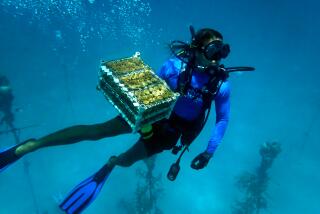Renegade Works to Preserve Everglades History : Florida: Legal and medical problems forced him to slow down and look around. He decided nature needed a little help.
- Share via
TEN THOUSAND ISLANDS, Fla. — His sun-browned, thickly veined forearms draped on the boat’s steering wheel, Totch Brown squints into the dark herd of clouds stampeding across the Everglades’ horizon.
“Looks like a northwester,” he mutters, mainly to himself. “We need to get over to the right of it.”
Calmly, he guns his 22-foot-long boat’s outboard motor and slices through the rising waves. Totch tells a passenger named Deborah to move to the back of the boat. She doesn’t, and he cuts the motor.
Totch waits, jaw set.
Deborah scrambles to the back.
Satisfied, he resumes the race against the storm and its now-lashing rain.
Totch stares into it while his passengers, pelted by rain and buffeted by swells, silently huddle and cling to each other’s yellow rain slickers.
A 15-minute eternity later, the storm is suddenly behind, and the passengers exchange grins and sighs and talk of how scary it had been.
The captain, meanwhile, opens the bottle of pills that help keep his damaged 75-year-old heart going. He gazes back at the storm clouds in retreat.
“Aw, that wasn’t nothin’ to me,” Totch says softly.
This, after all, is a man who has spent his life in the wilderness of the western Everglades, slipping boatloads of poached gators past rangers and holds full of marijuana past the Coast Guard. He has survived by shooting and eating the sea birds known as “Chokoloskee Chickens.” He has slept under the stars in defiance of the ravenous “swamp angels,” the mosquitoes.
Now, the water is calm and blue, the sun warms the soaked boaters, and birds rustle in the dark green mangroves of nearby islands.
“Now I’m going to sing you a song,” Totch says--one of his own.
And he does:
The sea cows graze along the riverside and the dolphins play.
They make me feel just like they’re a part of me. . . .
I knew right then old Mother Nature had made a place for me to stay. . . .
*
Loren G. (Totch) Brown was born in 1920 on the 150-acre shell island of Chokoloskee, where his grandfathers had settled in the 1880s. Today, Totch and Estelle, his fellow lifelong islander, wife of 56 years and his “Queen of the Everglades,” are among about 200 year-round residents.
Only twice has Brown lived away from the watery wilderness called Ten Thousand Islands, which begins about 80 miles west of Miami: He served in World War II, earning a Bronze Star at the Battle of the Bulge. And he spent 15 months in prison for tax evasion in the early 1980s.
Those legal problems, along with heart problems, forced Brown to slacken his usual pace of hunting, fishing or other, less reputable activity from dawn to dusk--and often dusk to dawn.
“Once I slowed down, I began to notice the Everglades,” he says. “I was always too busy trying to go out and get it every day to stop and see the very unusual beauty that we have.
“Our ways were just going to nothing. I started thinking, ‘Damn, we’re going to lose the history of the most precious place on Earth. My duty is to get this history down.’ ”
The result has been a book, “Totch: A Life in the Everglades,” and a public television documentary. A second book and documentary are in the works.
Occasionally, Totch also takes small groups--naturalists, journalists, fans of his book--on a personal, six-hour tour of the Ten Thousand Islands.
He docks his boat periodically for closer looks: at the mounds of oyster shells on which Calusa Indians made their homes centuries ago, at the beach where vigilantes stopped a desperado, at the key that has hosted a succession of hermits, at the moonshine still he helped his father run while the family lived in a tar-paper shack during the Depression.
He fondly recalls learning to hunt raccoons at night and ducks and deer by day, to fish for mullet, to pull up stone crabs and to gather clams to make chowder. Sour tamarinds provided snacks and skittering sand crabs were his toys.
He tends to brush away memories of sleeping with little protection from mosquitoes and storms, of sometimes subsisting on grits or tomato gravy.
“It certainly offered a good, clean, wonderful life to a youngster growing up,” he wrote in “A Life in the Everglades.” “It’s a shame every youngster don’t get a chance at a few years of that kind of living.”
There have been many outlaws in the land of Ten Thousand Islands.
Pirates once based operations here. Then there were hunters of legally protected birds, cigarette- and rum-runners, moonshiners, gator-poachers and pot-smugglers. In the early part of this century, bird wardens, sheriff’s deputies and federal agents met their deaths here.
Totch’s mother watched from a Chokoloskee beach in 1910 as an undetermined number of islanders opened fire on Ed J. Watson, a desperado who settled here after fleeing Oklahoma as a suspect in the slaying of outlaw Belle Starr. His death inspired Peter Matthiessen’s 1990 book, “Killing Mr. Watson.”
Ask Allison DeFoor II about the western Everglades and he immediately recalls his first visit, while on an undercover investigation.
One night, “an old, grizzled, one-eyed man comes up to me and says: ‘They know you’re here.’ ”
No need to elaborate. In an area where it seemed everyone was related and many were involved in illicit activities, “they” meant he was undercover no longer.
DeFoor slept with a revolver tucked under his pillow.
“This was like no man’s land,” says DeFoor, an attorney and Florida history buff who’s been a sheriff, prosecutor and judge. “These were seventh-generation scofflaws.”
In the 1980s, more than 100 people, about a tenth of the population, were arrested in sweeps of fishing villages where gold chains and fancy cars had suddenly become commonplace. Ten Thousand Islands, with its maze of coves and channels hidden by mangroves, was a fine place for smuggling marijuana.
“It’s a great stretch of coast for all kinds of things,” DeFoor says. “It’s mysterious. It’s a magical place.
“Totch Brown just sort of stands in that long tradition.”
Totch recalls going to see President Harry S. Truman’s 1947 announcement establishing Everglades National Park. He then set out on a gator hunt.
By Totch’s own code, he was entitled to go on making a living in his homeland, but he tried to avoid confrontations or openly flouting the law. He’d load his boat with up to 80 gator carcasses--he tells harrowing stories of seeing gators “come alive” after he had shot and boated them--during nocturnal hunts.
When marijuana smuggling came to the region in the 1970s, the question of legality didn’t bother Totch as much as his concern about the impact of drugs and about who controlled the trade. But he eventually decided marijuana wasn’t so bad, although he never tried it himself.
“Somebody on whiskey is twice as likely to run into you,” he reasons.
He was in need of expensive heart bypass surgery and he often thought bitterly about how the fishing business had declined under federal restrictions. So he was primed when one day in 1978, “my friend tapped me on the back and said I’ll get $15,000 pay for one hour’s work. Who in the hell would ever turn that down?”
Soon, Totch was going to Colombia and cutting deals with heavily armed foreign people in a foreign land. He blames his competitiveness more than desire for big money for driving him for four years, until he retired after making a “perfect haul” of a shrimper full of marijuana.
After a lifetime of escaping gators, rangers and coast guardsmen in the wild, Totch’s luck ran out when two Internal Revenue Service agents came knocking on the door of his home in 1982 to tell him he was under investigation for tax evasion.
Totch worked out a deal in which he paid a $1.25-million fine and turned over some $2 million in property. But he refused to testify against his friends, saying: “Not a tree grows tall enough to hang me from to get me to talk before a grand jury.”
He served his time in federal prison at Lexington, Ky., and returned home in 1985.
From time to time these days, he camps out alone on one of the mangrove islands, writing and reflecting about his past and the Everglades’ future.
“There used to be millions of little old creatures; turtles, moccasins, every log had something on it. These ponds had ducks by the jillions. All of it’s going down fast. I can just see it going,” he says.
As for himself, “I wouldn’t trade the free life I’ve had out here for anything. If I had to do it all over again, I’d go back down that old mosquito road and do the same things the same way.”
(BEGIN TEXT OF INFOBOX / INFOGRAPHIC)
Totch: A Life in the Everglades
Excerpts from book, published in 1993 by University Press of Florida:
On living on an island--with the mosquitoes--as a child during the Depression:
After we’d been living here for a while, sleeping on the ground, Dad built us a little tar-paper shack. It wasn’t screened in or shuttered till later, but least we had a roof over our heads, and when it rained, we no longer had to get out our bedrolls, stash away the bedding to keep it dry, and sit it out among the swamp angels.
Tricks to hunting alligators:
After a gator’s been shot, he’ll flop around for hours, scaring away any others I’m trying to slip up on. I take the gator by the snout, pull his neck up over the side of the boat, push down on the snout, and then chop the spine in two in the back of the neck.
On his brother’s brush with death:
The gator started running around on top of the water with his mouth wide open. Soon he headed straight into the front end of our pan, into Peg’s lap. When Peg tried to shove the gator away, he ended up with his whole arm in the gator’s mouth. By a miracle, the gator didn’t clamp down and Peg was able to pull his arm back, torn up a bit.
On Everglades preservation:
Maybe the time for us had simply run out. We’d had it long enough--some might say that we’d abused it long enough. But to my way of thinking, it was just the opposite: We cultivated the country. . . . Instead, others cut canals across the Glades, drained the rainwater into the salty Atlantic Ocean and played hell with my back yard.
Source: Associated Press
More to Read
Sign up for Essential California
The most important California stories and recommendations in your inbox every morning.
You may occasionally receive promotional content from the Los Angeles Times.













